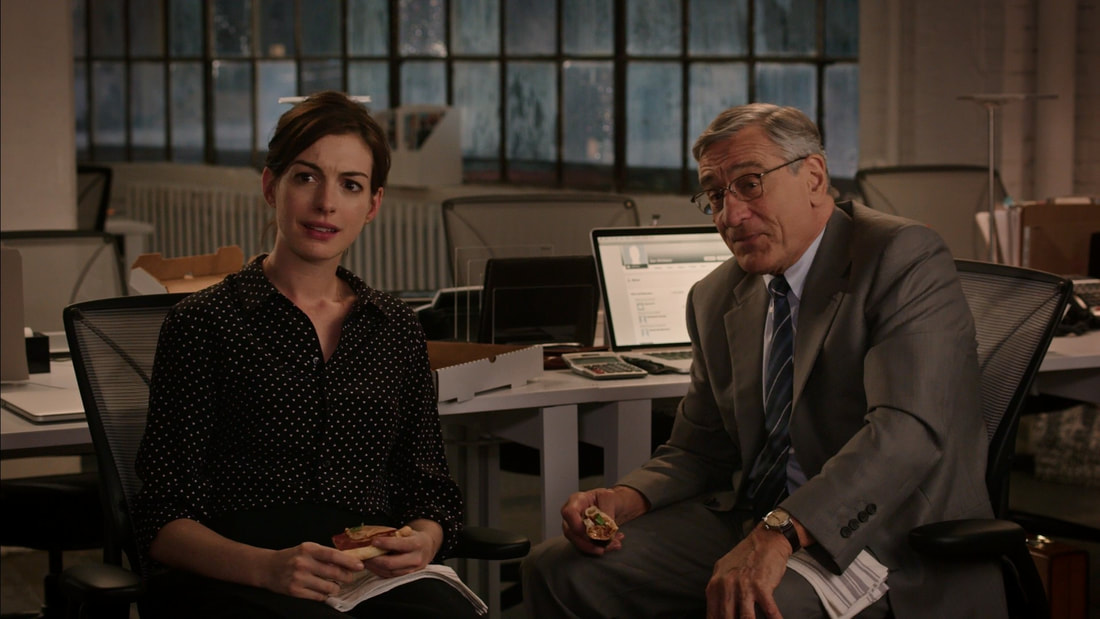Ben : [Smiles wryly] It would be hard not to.
The Intern is the exposé we didn’t know we needed on the challenges of generation gaps in today’s workplaces. Jules Ostin, CEO of her own company, seems to be the antithesis of Ben Whittaker; a senior intern drafted in to bring some old-school knowledge to her start-up. Nicknamed ‘boomer’ by his younger tech-savvy co-workers and standing out in his formal attire, Ben personifies the struggles of his generation in today’s working world.
While Ben needs his colleagues’ help navigating his MacBook, he brings his own brand of soft skills to the table which seem to have been somewhat forgotten in Jules’s fast-paced corporate empire. The crux of the film is that the senior intern, who seems out-of-touch, becomes the very person to support and motivate his millennial counterparts.
Is your workplace ready to rethink the generation-gap as a vital opportunity to apply innovation to experience?
Time to Review
Today inter-generational work teams are part and parcel of working life now that five generations are eligible for the labour force; a melting pot which includes traditionalist (born before 1946), boomer, gen X, millennial and gen Z (born after 1997). These different backgrounds unsurprisingly mean staff can feel highly differentiated.
According to the William Fry Employment Report of 2016, 71% of employers identify tech as a struggle for older workers, while the Deloitte ROI Millennial Report of 2017 revealed that, 52% of Irish Millennials believe businesses are still primarily focused on their own agenda. It is clear that different skillsets and priorities exist but stereotyping Millennials as tech-addicts and baby boomers as technophobic only serves to divide.
Rather than focusing on these disparities, tech can be employed as a unifier which can only reap rewards for your business with the unique knowledge that comes when those with different strengths share them with one another.
Ways to Unite
Successful communication between staff begins by forging commonalities, not emphasising differences.
o Office Communication Systems
The adoption of technologies such as Yammer and Slack act as a point-of-contact which can create the sense of community craved by the younger generations as well as the opportunity for the older generations to upskill themselves technologically. The platforms allow staff to communicate easily and to create different groups for collaborative projects. Team make-up can be the perfect opportunity to mix young and old, and the collective process of getting to grips with the office tech of choice can be a chance for staff to bond. In The Intern Jules helps Ben set up his Facebook account which brings them closer as colleagues.
o Let newer team members take on more responsibility
Webinars and video calls enable new team members to join in on a project from anywhere. Whatever method of inclusion you take, sharing company strategy, project updates and company successes with new staff will demonstrate trust and improve the employer-employee dynamic, especially with millennials who often prefer to work independently. Scenes in which Ben is helping the mail clerk in order to ‘keep busy’ act as a social commentary on the tendency for newer professionals to become side-lined from important projects, especially if faced with ageism, whether fresh-faced Generation Zer or seasoned ‘boomer’.
o Eliminate Unconscious Bias
Stereotypes can be detrimental to our decision-making processes and management of individuals in the workplace. Using AI software can be a great way to override this issue and ensure inclusivity. It can create factual documentation of conversations and ensure all relevant parties are emailed following meetings. Jules must specifically ask her assistant to CC Ben into e-mails after realising she has overlooked his potential. AI can forestall generational stereotypes to make for a more integrated team and inclusive company culture.
In Short
Workplace tech is the surprising unifier we need in today’s workplaces so we can move past the generational stereotypes. While Meyers’s film may oversimplify ageism into a binary of young and old –it effortlessly shows that the raw initiative of Generation Y and Z shouldn’t be overlooked and conveys the simple truth that ‘experience never gets old’.





 RSS Feed
RSS Feed